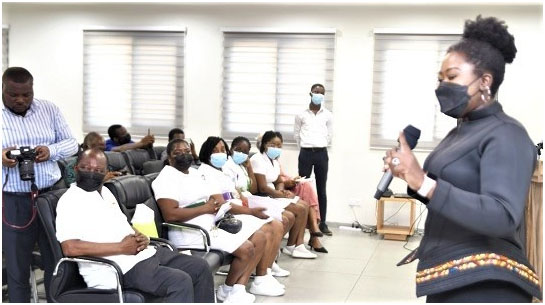Dr. Dziffa-Bella Ofori-Adjei speaking at the event
President of the Ophthalmological Society of Ghana, Dr. Dziffa-Bella Ofori-Adjei, has revealed that the wearing of eye glasses cannot prevent or correct glaucoma.
According to her, eye glasses only correct refractive errors of the eye and not the optical nerves, hence the need to screen for the disease which affects the optical nerves.
“You can wear glasses and still be infected by glaucoma, because spectacles only correct refractive errors and not the optical nerves, so I appeal to Ghanaians to screen for glaucoma, that is the only way to save your sight in this bright world,” she said.
Dr. Ofori-Adjei made the call in Accra when the society joined the Glaucoma Patients Association of Ghana and the Ministry of Health to launch the World Glaucoma Week.
She said glaucoma is the leading cause of irreversible blindness in the country, affecting about 500,000 Ghanaians out of which 45,000 had already gone blind.
Dr. Ofori-Adjei said the causes of the disease is not known and presents no warning signs and symptoms, however, the disease could be treated or managed when diagnosed early to either prevent or delay any progression to blindness.
She said although glaucoma was a treatable disease, it required the appropriate interventions across the management value chain to delay or prevent blindness.
She mentioned such interventions to include medical and surgical treatment, which has been captured under the National Health Insurance Scheme (NHIS).
“Medical treatment, though widely available in the country, is still outside the reach of many Ghanaians as only a few of the glaucoma medications are currently on the NHIS. I would like to use this opportunity to join my predecessors to ask for more glaucoma drugs to be included on the NHIS medicines list.
President of the Glaucoma Patients Association of Ghana, Harrison Abutiate, said the association continues to plead for the inclusion of more glaucoma medications into the NHIS medicines list.
As a pharmacist, he said the manufacture of eye medications locally must be encouraged to help make the country self-sufficient in eye medicines.
By Jamila Akweley Okertchiri


